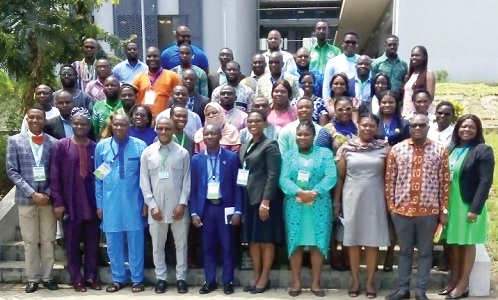Developing countries must restructure their economies to be more sustainable and resilient to global shocks.
The National President of World Energy Council Future Energy Leaders Ghana, Prosper Ahmed Amuquandoh, who made the call, said it was time for leaders and duty bearers to have discourses that would inure to the benefit of their countries, instead of unproductive banters.
“This is not the time to indulge in business-as-usual conversations, and this is not the time for developing economies to engage in the usual unproductive and divisive political banters on the development agenda of their countries”.
Mr Amuquandoh was delivering the keynote address at the third Sustainable Development Conference at the University of Environment and Sustainable Development (UESD) at Somanya in the Eastern Region.
The programme, which had some participants attending from Nigeria, was on the theme: “Integration of Responsible Production and Consumption into Development Agenda of Developing Economies: Exploring Policies and Scientific Options”.
Collaborative efforts
The conference discussed circular economy and healthy food systems; clean, affordable and sustainable energy; public health and clean environment; biodiversity and ecosystem restoration; consumption behaviour and socio-economic development; and gender, production and consumption.
Mr Amuquandoh, a trained physicist, and an energy engineering, and policy professional said the integration required a combination of policies, strategies, scientific innovations, collaborative efforts and actions to ensure that economic growth was pursued in a way that was environmentally friendly, socially equitable and economically viable.
“I am not talking about token development plans/agendas by political parties of the day that do not stand the test of time, but are only in place within the tenure of the parities that initiated them.
I am talking about long-term development agendas that are collectively developed by all and have the buy-in of the majority of the citizens of these economies.”
“I am talking about legally binding development plans that will outlive the tenure of any party, and are actively and systematically implemented by all citizens,” he said.
Mr Amuquandoh, a Mandela Fellowship Fellow, also suggested that developing economies should enforce regulations that promoted sustainable production practices, develop and support programmes that promoted resource efficiency in industries, provide tax incentives and subsidies to businesses that adopted environmentally friendly production methods or produced sustainable products, and implement public awareness campaigns and educational programmes.
He stated that in developed countries, scientific studies or research preceded policy formulation, with leadership empowering their scientists and researchers with the needed resources and rallying them to carry out studies to produce empirical evidence to inform policy formulation.
That, he said, was a fundamental principle in results-based policy formulation, adding that “now, if you get this fundamental principle weak in your policy formulation process, the shambolic state of the economy will expose you”.
Key policies
The Chief Analyst/Sustainable Development Goal Coordinator of the National Development Planning Commission, Dr Richard Osei Bofah, lauded the university for holding substantial potential in advancing Goal 12 of the SDG which is responsible consumption and production.
He said one of the prominent challenges undermining goal 12 implementation was the prevalence of unsustainable mining practices.
He explained that in many regions in Ghana, mining activities often prioritised short-term gains over long-term environmental considerations.
The Vice Chancellor of UESD, Prof. Eric Nyarko-Sampson, said as academics and practitioners, it was important for the university to work together to improve resource efficiency, reduce waste and pollution, and shape a new circular economy.
He said as the university envisaged creating knowledge through research for national development.

